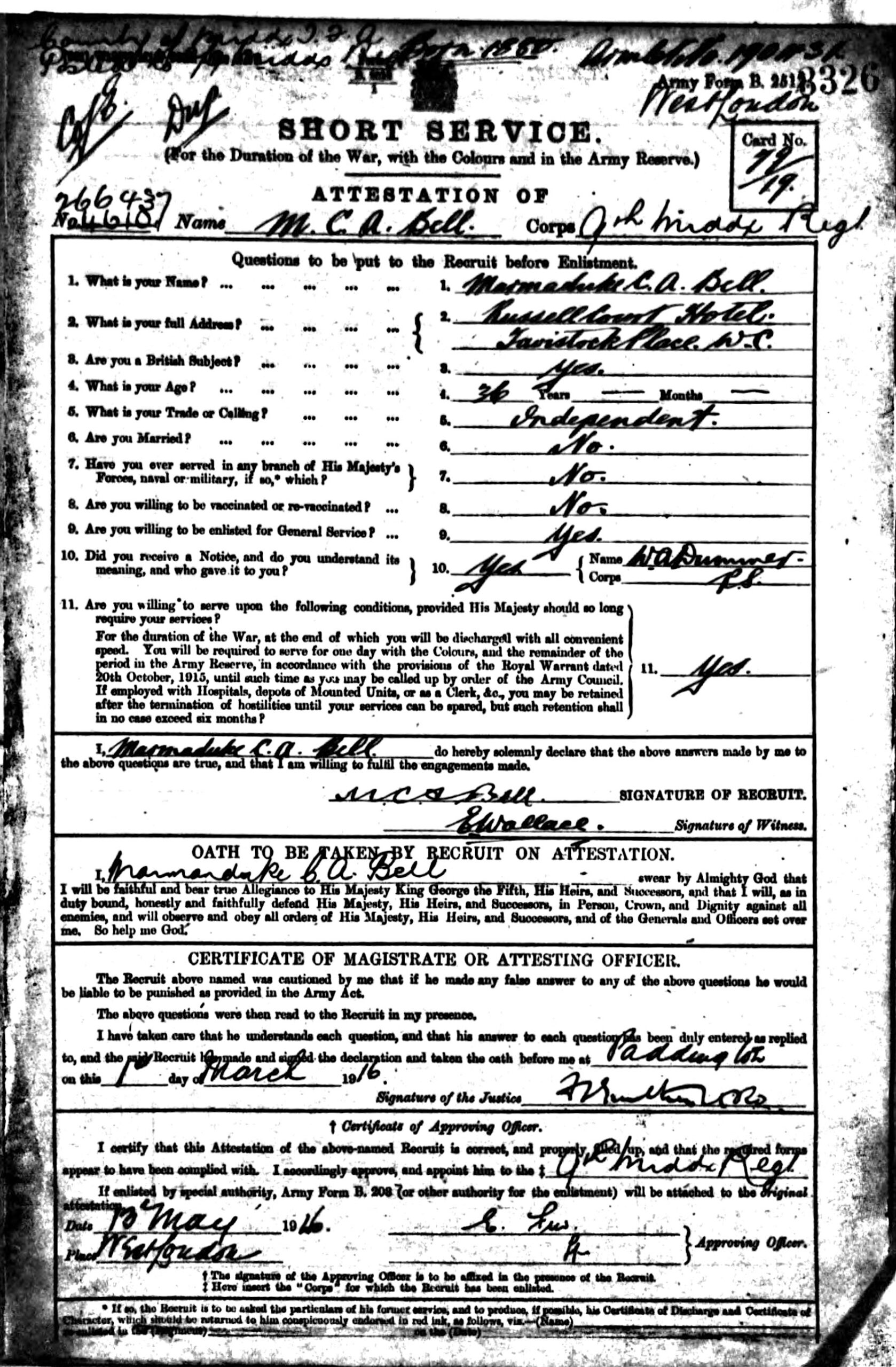Another mysterious death in Paris.
I have already written about the sad life of Mary Isabella Bell and her death in Paris in 1866. (https://gsq-blog.gsq.org.au/paris). In that post I mentioned that her nephew, Marmaduke Charles Alexander Bell, had also died there almost a century later. We know little about the circumstances of their deaths or why they were in Paris.
Marmaduke Charles Alexander Bell was born in 1880 and was the only child of Marmaduke Alexander Bell (who I have written about before https://gsq-blog.gsq.org.au/the-marmadukes) and Agnes St Leger Bell, sometimes known as Agnes Emily Sippel Bell (also known in the family as Jack) who had married in 1879.[1]
The marriage was not a happy one and in 1883 Agnes disappeared. Apparently she had ‘wandered’ to Liverpool and taken a ship to America ending up in Minnesota where she taught French and Italian and gave singing and piano lessons. Her son, Marmaduke, was only three years old so he presumably went with her. She claimed she had left her husband on the grounds of cruelty.[2]
Her husband eventually tracked her down in America and the family returned to live in various places in Ireland. But in the early 1890s, Agnes left again for America, once again probably taking her child. Perhaps her son never saw his father again as Marmaduke senior died in 1900.
Mother and son must have returned to England as on 1 March 1916, Marmaduke enlisted to serve in World War 1. He was 37, 5 feet 9 inches with a ‘girth’ of 36 inches, a fair complexion and grey eyes and his address was Russell Court Hotel, Tavistock Place, London. The enlistment record shows that he was not willing to be vaccinated. He was a bachelor with ‘independent’ means so his father, Marmaduke, must have left him an inheritance.
He joined the army as a private and became a member of the 9th Battalion of the Middlesex Regiment of the Territorial Force. He was mobilised on 13 May 1916 and posted on 24 May 1916 to the home front which meant that he could have worked in various roles, such as providing food and making and delivering supplies to the armed forces. However on 28 July 1916, he was admitted to hospital for pernicious anaemia and over the next year, he went to hospital six times with anaemia and abdominal haemorrhaging with stays up to 46 days. He was finally discharged from hospital on 13 September 1917.

World War 1 enlistment record for Marmaduke Charles Alexander Bell. UK, World War 1 Pension Ledgers and Index Cards, 1914-1923. Ancestry.com
On 4 October 1917 he was discharged from the army ‘being no longer physically fit for further war service’. He was assessed as ‘A man of very good character. He is a linguist and desires such employment.’ In October 1918 he was sent an order to present himself for a medical re-examination and was eventually put on a pension after the war for those injured or killed during the war.[3] During this period his mother was living in England with her address on his military papers as Home Farm, Irving Park, Hertfordshire.[4]
Two years later in 1920, Marmaduke was living in Leigh Street, Wigan in north-west England not far from Manchester.[5] Meanwhile his mother, who was known as and signed her letters as Jack, had once again moved to America and was living in East Orange, New Jersey, in a rather grand house, now a school. She wrote to her husband’s great nephew, Edmund Kelly, who may have been in France at the time. Her letter reported that she led a ‘very dull hum-drum life & have no news’. There was no mention of her son. She hoped that Edmund was
‘with people who speak good French, as there are no places in the world where you can find worse French than in both Paris & Brussels! Your great uncle Marmaduke was so shocked at my French, that when we had been only a few months married he left me in the Convent du Sacre Coeur at Tours, France, to study French conversation with the school girls there. I was then very young & had a fine time!’
How true this anecdote was is debatable as she was a woman with a rather flamboyant history! She also reported in the letter that she had been suffering from ill health. She died in 1928.
What her son Marmaduke was doing in the period between the wars is a mystery. What we do know is that he must have been in Paris during World War 2 as he became a prisoner of war. He may have been rounded up with other British citizens soon after Paris fell to Nazi Germany on 14 June 1940 and became a prisoner of war. Why didn’t he leave before the Germans entered Paris in 1940 as many people did by escaping across the Spanish border?
Whatever happened, it is clear he suffered ill health for most of his life and being a prisoner of war for almost two years would have been devastating for his health. He died on 11 March 1942 of ‘intestinal obstruction’ at the military hospital Val de Grace, on the Rue St Jacques, Paris at the age of 62.[6]

The old buildings of the Val-de-Grace, Paris. By David Monniaux, CC BY-SA 3.0 http://creativecommons.org/licenses/by-sa/3.0/ via Wikimedia Commons
What was Marmaduke doing in Paris? Perhaps he went to France as a language teacher and was there when Paris fell. Perhaps he was a spy!
After the war, his estate was administered (he died intestate) and included in the administration papers, is a translation of the details of his death at the Val de Grace hospital in Paris.
Marmaduke Charles Alexander Bell died at 277b rue St Jacques [address of Val de Grace hospital] on 11 March 1942 at 3am, resident of 74 Dover Street London [England] born in London on 11 January 1880, music teacher; his parents’ names were not known to the informant. Bachelor.
Perhaps the London address was his last known address in England. There was no French address and the question of why he was in Paris had still not been answered at the time his estate was being administered in 1943. One of the papers includes the sentence, ’The question as to whether the Deceased may possibly have been domiciled in Paris has not been finally resolved.’
Why was Marmaduke in Paris and was he living there? In which French prisoner of war camp was he held? Where was he buried? Was he a language teacher and/or music teacher? My quest to find out more about this Marmaduke has ended in many unanswered questions.
[1] UQFL79, Series A, File 13, Box 3, Folder 4. Marmaduke Charles Alexander Bell Estate Papers.
[2] Gloucester Citizen, Tuesday 16 January 1883.
[3] UK, World War 1 Pension Ledgers and Index Cards, 1914-1923. ancestry.com
[4] UK, British Army World War I Pension Records 1914-1920. ancestry.com
[5] England and Wales, Census Land and Surveys , Electoral Rolls, Electoral Registers 1910-1932. FindMyPast.com
[6] Germany, Deaths of German Citizens Abroad, Registries from Berlin Standesant 1, 1939-1955. Certificate No. 1334. This information came from the Information Centre for Warrior Officers and Prisoners of War. ancestry.com

Comments
Another mysterious death in Paris. — No Comments
HTML tags allowed in your comment: <a href="" title=""> <abbr title=""> <acronym title=""> <b> <blockquote cite=""> <cite> <code> <del datetime=""> <em> <i> <q cite=""> <s> <strike> <strong>